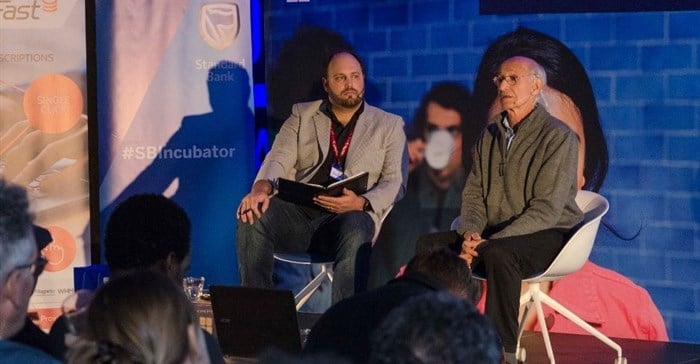






Spur's sprightly workaholic founder, Allen Ambor, is a man that wears many hats: award-winning businessman, actor and yoga teacher. As the featured guest at this month’s Startup Grind Cape Town event, he shared his journey from determined teen to hands-on business owner.
Between the ages of 15 and 23, Ambor held various jobs working at a deli, a footwear manufacturer and as a soccer coach at a school, but it was his stint at a Johannesburg steakhouse that struck a chord with him. “I fell in love with being in a restaurant and loved the idea of being around people and being able to engage and satisfy them. The environment suited me.”
After one year at university he decided he would move to Cape Town and open a steakhouse. The next two years were spent searching for ideal premises to house his new business idea. “I would drive around Cape Town looking for buildings being built. Believe me, in 1964/65 in Cape Town nothing was happening – it was like East London that had gone to sleep; but I never gave in. I carried on coming down for two-and-a-half years every three months until on the last trip, my friend Tommy – who would later become junior partner – met with an agent in Newlands.”
Scanning the Newlands area, which was and still is home to a brewery, cricket grounds and some good schools, a 24-year-old Ambor saw potential. With R2,000 of his own, R4,000 from his father – who had promised double the amount that his son could save – and some extra capital from a last-minute partner who was eventually bought out, Ambor set out to secure the lease.
“On 24 October 1967, Golden Spur was opened and the rest was chaos and history.”
“We were profitable from day one. We assembled a fantastic business in the right place at the right time. We had queues day and night, even in the rain. They loved the food, décor and energy – people wanted to be there.”
According to Ambor, personalised service was almost non-existent in Cape Town’s restaurant industry at that time and Spur filled that void. “We met people at the door, we welcomed children, we were efficient, and every everything was made fresh to order. There was a pizzazz about it.”
“I knew that if people experienced what Spur had to offer, they’d come back. We bent over backwards to help people. That’s how we became successful.”

Ambor practised a hands-on approach to hiring and training staff, which proved a struggle at times. “In Cape Town, the staff were unfortunately very much affected by the Dop System, which was [and is] a social ill and it made me work to an extent that I wouldn’t want anybody to experience. It was seriously debilitating. But I had my dream and I was running with it."
“What’s important as far as staff is concerned is that you hire attitude and then train their skills.”
He admitted that he was strict when it came to managing staff to ensure that they were constantly performing. “I started out sweet and innocent … but I soon realised that I had to toughen up if we were going to survive. It had to be my way or the highway. My attitude was I don’t care who suffered as long as it wasn’t the customer. I suffered plenty, I was overworked and I demanded a lot from my staff.”
“Often I would get a new young waiter in who was often from university, and I would tell them what to do and then, there’s only one way to put it – k*k on them when they weren’t doing it properly because I was like Jekyll & Hyde … And sometimes I would find their book with their orders and pen on the fridge and they were gone,” he said.
The superior service expectations that were drilled into the company's employees is what helped grow the business, the founder said, and remained under close surveillance even when the brand started franchising. “The franchise contract was very firm. The brand grew because everybody was highly trained and everybody was expected to make sure the business never suffered.”
Regular store visits are still carried out to ensure everything is being done as specified. The ‘bad stores’ are visited more frequently and if they don’t perform they’re made aware that they’re at risk of losing the brand.
Franchising offers a level of brand security, he said. “People are motivated when they are given a share in the business. Having an owner in the store – which is what franchising is – gives you a level of security.”
Despite Ambor’s tough approach, many Spur employees have remained loyal and dedicated to the company. CEO Pierre van Tonder started as a junior manager at Spur in Sea Point 30 odd years ago, while Ambor’s first financial director remains a part of the company’s finance team. A number of franchisees have been with Spur for over 30 years.
“People worked hard because the business demanded it. I kept a close hold on our staff and looked after them well financially. People stay because they get job satisfaction and feel fulfilled.”
“A talent of mine is spotting good people. I hire people, monitor them closely and then I let them fly.”
